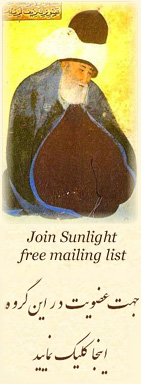Sunlight offers Ghazal (Ode) 2946, in a version by Coleman Barks,
and in translation by A.J. Arberry:
^ ^ ^ ^ ^
"You Are As You Are"
Yesterday, you made a promise.
Today, you broke it. Yesterday,
Bistami's dance. Today, dregs
thrown out. In pieces, and at
the same time, a perfect glass
filled with sunlight. Give up
on figuring the appearances, the
dressing in green like a Sufi.
You don't resemble anyone. You're
not the bride or the groom. You
don't fit in a house with a family.
You've left the closed-in corner
where you lived. Domestic animals
get ridden to work. Not you. You
are as you are, an indescribable
message coming on the air. Every
word you say, medicine. But
not yet: stay quiet and still.
-- Version by Coleman Barks, with Nevit Ergin
"The Glance"
Viking-Penguin, 1999
~~~~~~~~~~~~~~~~~~~~~~~~~~~~~~
Yesterday you made compact and repentance, today you have
broken them; yesterday you were a bitter sea, today you are a
pearl.
Yesterday you were Bayazid and were augmenting; today
you are in ruins, a dregs-seller and drunk.*
Drink the dregs, O soul! Break from reason, O soul! Do not
wear blue, O soul, until you worship idols.*
Today you are very dissolute, you share the cup with the sun;
You are not the master of the moon, nor the husband of the
lady.*
You are greater than dwellings, you are outside mines; you
are not that, but you are just as you are.
One corner you were bound up, of that corner you were sick;
you opened that which was bound and escaped wholly, escaped.
A beast is not a rider, it is only for the sake of labor; you are
no beast, you are a living man and you have leaped from labor,
leaped.
You are a heavenly messenger; how can you be like the moon
until you ride aloft and are in the hand of the thumbstall?
Silence, give no sign, though you have expressed everything; every
wounded one you have wounded has become the salve of a world.
-- Translation by A.J. Arberry
"Mystical Poems of Rumi 2"
University of Chicago Press, 1979
Arberry's notes:
* "Bayazid" -- (Ba Yazid; Abu Yazid-i Bistami), the famous mystic
of Khorasan (died 261/874 or 264/877, hero of many spirtual anecdotes.
The point of this anecdote is the pun between "kharbanda" ("ass driver")
and "banda-yi Khuda" ("slave of God").
* "do not wear blue" -- the robe of the Sufis usually was blue.
* "master of the moon, etc." -- "Mahasti" means "you are a moon",
or, "the lady of the moon", or simply, a lady.
Sunlight note:
* "Thumbstall" -- protective covering for the thumb; a device which
covers the thumb for a specific purpose, such as a rubber cover which
aids in sorting mail.
The media:
http://tinyurl.com/23ok4n
^ ^ ^ ^ ^
~






